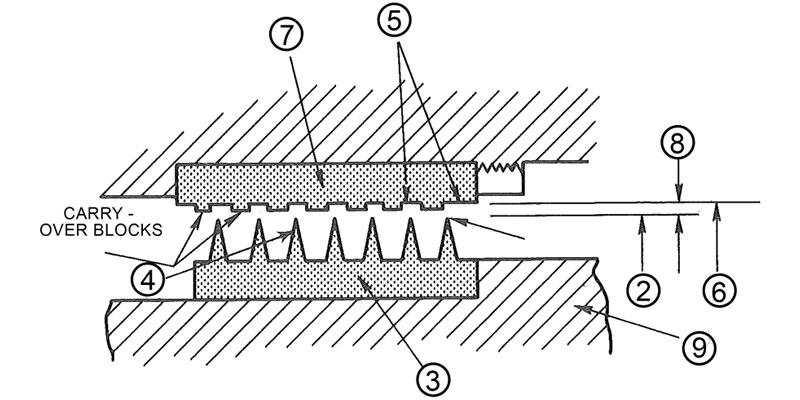Typical Labyrinth Seals: Straight-Thru with Carry-Over Blocks
Sourced from the ASLE Seals Special Publication

1. Carry-Over Blocks
2. Knife-Edge Diameter
3. Knife-Edge Ring
4. Knife-Edges
5. Land
6. Land Diameter
7. Land Ring
8. Radial Clearance
9. Shaft
1. Carry-Over Blocks: An abrupt, step-like protrusion from the land of a labyrinth seal. The blocks are positioned between the knife-edges to produce additional turbulence in the leakage fluid and to increase sealing efficiency.
2. Knife-Edge Diameter: The diameter which corresponds to the farthest outward protrusion, or to the farthest inward protrusion, of the knife-edge of a labyrinth seal.
3. Knife-Edge Ring: A ring shaped member in a labyrinth seal, in which the knife edges are machined or on which the knife-edges are mounted.
4. Knife-Edges: The narrow, circumferential knife-like edge or lip on a labyrinth seal which combined in series with other knife-edges, accomplished the throttling which achieves the seal.
5. Land: The cylindrical surface of the land ring in a labyrinth seal, which makes the closest approach to the knife-edges.
6. Land Diameter: The diameter of the cylindrical surface which is in closest proximity to the knife-edges and which, in combination with the knife-edges, effects the seal.
7. Land Ring: A ring shaped member in a labyrinth seal, which is either a straight-walled cylinder or a cylinder with axial steps. The land ring forms a clearance with the knife-edges effecting the seal.
8. Radial Clearance: Half of the total difference between the nominal land diameter and the nominal knife-edge diameter.
9. Shaft also known as Bore Seal: A device the outside-diameter surface of which mates with a bore surface. It provides sealing between these two surfaces.
